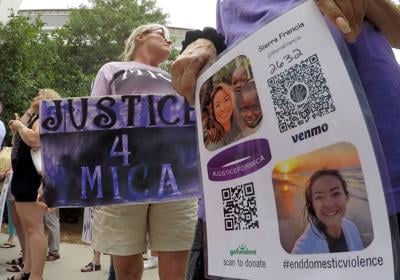MYRTLE BEACH — Nearly a year after Mica Miller's death , a state senator has introduced a bill that aims to criminalize coercive control, a type of systematic abuse that Mica's supporters have long sought to prevent. Mica, who was married to embattled pastor John Paul "J.P.
" Miller , died by suicide in a North Carolina state park on April 27, 2024, two days after serving her husband with divorce papers. Her family filed court records accusing the pastor of abusing Mica, though he has repeatedly denied these accusations . Since her death, Mica's family and friends have urged state lawmakers to pass coercive control legislation.

"That's a huge win," said Regina Ward, an attorney for Mica's family, referring to the bill introduced on April 22. "That is one leg of justice for Mica and all victims." Mica Miller Coercive control is a behavior pattern that establishes dominance over another person through intimidation, isolation and threats of violence, according to the National Library of Medicine .
Although past efforts to pass this type of legislation in South Carolina failed, the latest bill was filed by state Sen. Stephen Goldfinch, R-Murrells Inlet, who said he was inspired by Mica's case. Goldfinch said he's been contacted by at least a dozen women, including former classmates, who shared their stories and urged him to move the legislation forward.
He also heard from Mica's family. "It's a big deal around here and I'm honored to be able to do it," he said. "I sort of thought this was a fairly rare thing but definitely needed to be addressed.
Evidently it's not a fairly rare thing. It's a fairly widespread thing." The bill describes the offense this way: "When two persons are personally connected, it is unlawful for one person to repeatedly .
.. engage in a course of behavior toward the other person that is coercive or controlling and that results in the person fearing, on at least two occasions, that violence will be used against them or that results in their mental distress such that their day-to-day activities suffer substantial adverse effects.
" The bill states that coercive control could include any of the following behaviors: isolating a person from their friends and family; depriving them of basic needs and support services; monitoring their time, finances and online communications; controlling their daily lives, including how they dress, where they can go, what they see and when they sleep; and repeatedly insulting them. The bill also lists the type of evidence that could prove coercive control, including a person's diary, copies of emails, phone records or text messages; evidence of abuse over the internet, digital technology, or social media platforms; evidence of assault; photos of injuries; 911 tapes or transcripts; body-worn camera footage; medical records; witness testimony; and bank records, according to the bill. Prosecutors could also look at evidence of isolation, such as a lack of contact with family and friends, or a victim withdrawing from activities and life events.
The offense would be classified as a felony and punishable by up to 10 years in prison and/or by a fine of up to $10,000. Goldfinch's bill is an updated version of three previously drafted coercive control bills that were proposed between 2020 and 2021. All three never made it out of committee.
Last year, Ward formally requested that state Sen. Luke Rankin, R-Myrtle Beach, revitalize a coercive control bill and rename it "Mica's Law." Rankin chairs the Senate Judiciary Committee.
Ward, who had represented Mica, alleged that her client had experienced coercive control, citing her statements to Ward and her personal writings, according to her June 5, 2024 letter to Rankin. "In the state of South Carolina, we still have archaic domestic violence laws which recognize abuse only as physical," Ward wrote. "Victims of psychological abuse suffer immeasurable damage impacting .
.. every facet of their everyday life.
We do not know if Mica took her life simply because she was manic or whether she possibly died as a way to escape the alleged abuse. What we do know is that coercive control is a real form of abuse." Rankin could not be reached for comment.
Despite the unsuccessful history of coercive control bills in South Carolina, Ward said she's optimistic about the new proposal. She said the previous bills were not well crafted and the public has become more aware of the issue over the last year because of Mica's case. "This one is different," she said.
"I do think that it will have more momentum." Although this legislative session is wrapping up, Goldfinch and Ward said their hope is that the bill will soon be assigned to a subcommittee. Legislative terms in South Carolina last for two years, meaning it has all of next year to be addressed as well.
Ward said she'll be collecting signatures on a petition in support of the bill. "We need to continue to apply the pressure," she said. "That's what's got to happen to keep it alive.
".
Technology

SC failed 3 times to criminalize coercive control. Could Mica Miller's story help this time?

Nearly a year after Mica Miller's death, a state senator has introduced a bill that aims to criminalize coercive control, a type of systematic abuse that Mica's supporters have long sought to prevent.















